| |
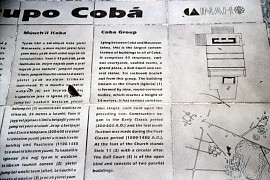 Enlarge this shot to read about the Cobá site.
Enlarge this shot to read about the Cobá site.
|
| |
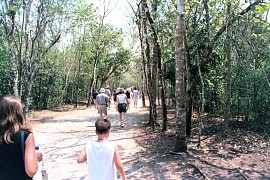 Now we are setting off to visit more ruins. We have been extensively warned
about not touching any of the trees - they are "poison". I think just like
we have poison ivy, they have poison trees. Miriam said that if you contact
the trees you will be miserable for 3 days.
Now we are setting off to visit more ruins. We have been extensively warned
about not touching any of the trees - they are "poison". I think just like
we have poison ivy, they have poison trees. Miriam said that if you contact
the trees you will be miserable for 3 days.
|
| |
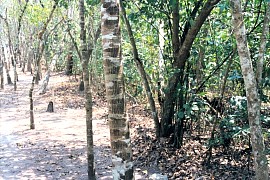 I don't remember the name of this kind of tree, but Miriam said it was
very special. The Mayan priests would collect the sap from this tree, mix
it with corn and water, and then leave it in a sinkhole (limestone
depression in the earth) for a few days to ferment. Then they would drink
this liquid and hallucinate.
I don't remember the name of this kind of tree, but Miriam said it was
very special. The Mayan priests would collect the sap from this tree, mix
it with corn and water, and then leave it in a sinkhole (limestone
depression in the earth) for a few days to ferment. Then they would drink
this liquid and hallucinate.
|
| |
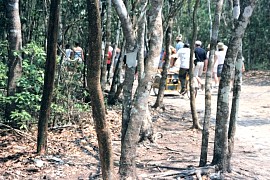 These two types of tree are always found growing together. The lighter
barked trees are the poison trees. The darker barked trees are balsa wood.
These two types of tree are always found growing together. The lighter
barked trees are the poison trees. The darker barked trees are balsa wood.
|
| |
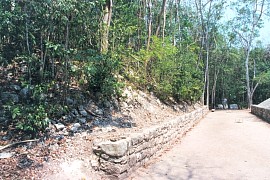 These next two pictures go together. This one shows a ball court that has
not been restored.
These next two pictures go together. This one shows a ball court that has
not been restored.
|
| |
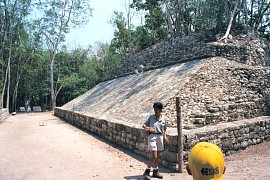 Here is the other side of the ball court that has been restored. How did they
figure out how it should look? It's just a guess - that's the biggest
surprise to me about the Mayan ruins. No one knows what the structures
*really* looked like.
Here is the other side of the ball court that has been restored. How did they
figure out how it should look? It's just a guess - that's the biggest
surprise to me about the Mayan ruins. No one knows what the structures
*really* looked like.
|
| |
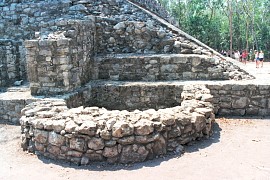 Miriam the guide said that this was most likely a hot tub that the players
could make use of, probably in some sort of ritual.
Miriam the guide said that this was most likely a hot tub that the players
could make use of, probably in some sort of ritual.
|
| |
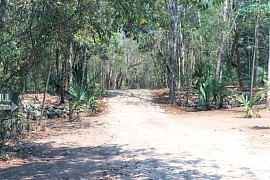 Our path rises up over an ancient Mayan roadway - a "sacbe". The
Mayans had an
extensive system of raised paved roads. Today's engineers are amazed
how roads ran in a straight line through the jungle.
There are around forty converging sacbe, one of which has been
traced a distance of 60 miles (100 km). Each sacbe was constructed
with stones to a height of one to two meters and
then covered with white mortar. Their purpose is puzzling as this
civilization had no wheeled transport and had yet to see
the horse, but may have been built for religious processions and
pilgrimages.
Local workers
from nearby agricultural land would also be responsible for labor for
building and maintaining the roads. This area was home to 50,000 Mayans
in antiquity. Picture this place with no trees! They were all cut
done during Coba's peak occupancy.
Our path rises up over an ancient Mayan roadway - a "sacbe". The
Mayans had an
extensive system of raised paved roads. Today's engineers are amazed
how roads ran in a straight line through the jungle.
There are around forty converging sacbe, one of which has been
traced a distance of 60 miles (100 km). Each sacbe was constructed
with stones to a height of one to two meters and
then covered with white mortar. Their purpose is puzzling as this
civilization had no wheeled transport and had yet to see
the horse, but may have been built for religious processions and
pilgrimages.
Local workers
from nearby agricultural land would also be responsible for labor for
building and maintaining the roads. This area was home to 50,000 Mayans
in antiquity. Picture this place with no trees! They were all cut
done during Coba's peak occupancy.
|
| |
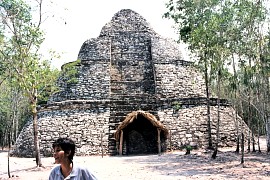 Yet another pyramid. Note the steepness of the steps.
Yet another pyramid. Note the steepness of the steps.
|
| |
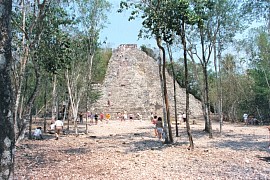 We approach the largest Mayan pyramid here at Cobá, Nohoch Mul (large hill).
Nohoch Mul is a staggering 136 ft (42 m) high and towers above the jungle.
We approach the largest Mayan pyramid here at Cobá, Nohoch Mul (large hill).
Nohoch Mul is a staggering 136 ft (42 m) high and towers above the jungle.
|









